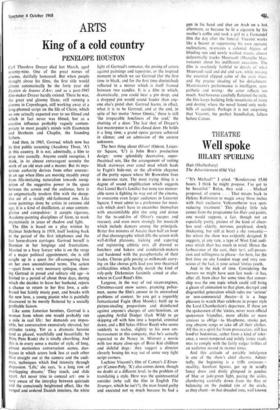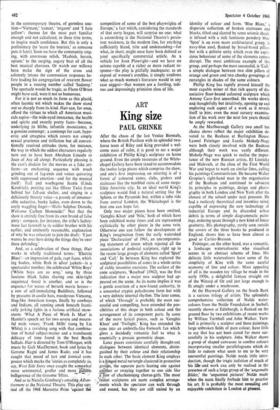THEATRE
Well spoke
HILARY SPURLING
Hair (Shaftesbury) The Advertisement (Old Vic) ' "It's Michael!" I cried. "Rendezvous 15.00 hours. I think he might propose. I've got to be beautiful." Relax, they said . . . Michael proposed, of course . . . That means back to Helena Rubinstein to magic away those inches with their exclusive Volcanotherm wax spot- reducing treatment.' This plucky little tale comes from the programme for Hair and paints, one would suppose, a fair, though not an especially pretty, picture of the kind of cheer- less soul—elderly, nervous, perplexed, slowly thickening, but still at heart a shy romantic— for whom the show was evidently designed. It suggests, at any rate, a type of West End audi- ence which Hair has much in mind. hence the forbearance of the cast, their tact, self-posses- sion and willingness to please—for here, for the first time on any London stage and very con- scious of the fact, is your actual 'sixties youth.
And in the nick of time. Considering the horrors we might have seen last week—it has, after all, been clear for some time that censor- ship was the one topic which could still bring a gleam of animation to that glum, decrepit and disgruntled generation which rules our 'serious' or non-commercial theatre—it is a huge pleasure to watch Hair celebrate in proper style the Lord Chamberlain's departure. If these are the spokesmen of the 'sixties, never were official spokesmen friendlier, more affable or more anxious to oblige—to blaspheme, smoke pot, sing obscene songs or take off all their clothes. All this in a spirit far from provocative, still less lawd'or hedonistic, rather from a kind of toler- ance, a sweet-tempered and mildly ironic readi- ness to comply with the fairly vulgar foibles of an audience reared in sterner times.
And this attitude of amiable indulgence is one of the show's chief charms. Admit- tedly, the beginning is a trifle ominous— stealthy, barefoot figures, got up in scruffy fancy dress and dimly glimpsed in patches of blue or jade-green light, pacing the aisles, clambering carefully down from the flies or balancing on the padded rim of the circle, as they chant—in that dreaded tone, well known in the contemporary theatre, of gormless unc- tion—'Vietnam,' cancer,"orgasm' and 'I hate yellow': themes for the most part familiar enough and not calculated, in these trite terms, to inspire much confidence. But this is only a preliminary (to 'scare the tourists,' as someone puts it later). Soon we have the community sing- ing, with enormous relish, 'Hashish, heroin, opium,' to the surging, sugary beat of all the best musical choruses. Or watch our willowy hero make the sign of the cross and solemnly intone the communion responses be- fore leading his congregation of reverent flower people in a rousing number called 'Sodomy.' The spectacle would be tragic, as Flann O'Brien might have said, were it not so humorous.
For it is not so much its form as this placid, often laconic wit which makes the show stand out so sharply from its kind. Hair can, for once, afford the virtues to which all American musi- cals aspire—the wide-eyed innocence, the health and spirits and sweetly pretty faces—because, underlying its blithe, infantile insouciance, is a genuine contempt : a contempt for cant, hypo- crisy and smugness which covers not simply sexual prurience and titillation but all conven- tionally received attitudes (note, for instance, the way in which the oddest characters regularly turn out to have been Abraham Lincoln or Joan of Arc all along). Particularly pleasing is the cast's disdain for the movies as a fake art- form—an enchanting sequence with much grinding out of fag-ends and voices quivering with suppressed emotion—and for the musical itself: frail and woebegone Jeanie (Linda Kendrick), peeking out like Oliver Twist from behind her fall-out shelter, and singing in a deliciously throaty voice—a parody of innumer- able seductive, husky ladies, even down to the coyly waggling finger—'Hello Sulphur Dioxide, Welcome Carbon Monoxide!' Not that the show is entirely free from its own brand of false piety: compare, for instance, the tribe's lachry- mose last farewell to its soldier brother with his earlier, and eminently reasonable, explanation of why he was reluctant to join the draft: 'I just wanna be over here doing the things they're over there defending.'
And, as a celebration of these things, Hair works in wholly traditional terms : 'Electric Blues'—an impression of pale, rapt faces, whirl- ing bodies, white flesh in silver jackets—is a spectacular number; the celebrated 'White Boys' ('White boys are so sexy,' sung by three luscious black ladies sharing one skin-tight sequinned dress) is another, and so is the sequence for waves of berserk movie heroes— a row of self-immolating Buddhists, followed by peasants in coolie hats, murderous Vietcong, thug-like American troops, finally by cowboys and Indians, all running amok beneath franti- cally jerking lights in a furious artificial snow- storm. 'What A Piece of Work Is Man' is Hamlet's speech set for two severe and mourn- ful male voices; 'Frank Mills' (sung by Liz White) is a ravishing song with that combina- tion of banal subject-matter and a translucent delicacy of tone found in the best Beale ballads. Hair is directed by Tom O'Horgan, with Music by Galt MacDermot, book and lyrics by Gerome Ragni and James Rado; and it has Caught that mood of tart and ironical com- posure which marks the 'sixties as completely as, say, West Side Story once caught the somewhat more sentimental, gruffer and more liable
belligerence of the tiresome 'fifties. 7 - And so to Natalia Ginzburg's amazing Adver- tisement at the National Theatre. This play car- ried off the 1968 Marzotto Prize 'against the
competition of some of the best playwrights of Europe,' a fact which, considering the standards of that sorry league, will surprise no one; what is astonishing is the National Theatre's persis- tent weakness, in the modern line, for anything sufficiently bland, trite and undemanding—for what, in short, might once have been defined as your specifically commercial article. As a vehicle for Joan Plowright—and we have no actress capable of a richer or more radiant re- sponse—the play is pitifully inadequate; as an expose of women's troubles, it simply confirms what so much women's literature would in any case suggest—that women are a footling, tedi- ous and depressingly primitive class of life.







































 Previous page
Previous page